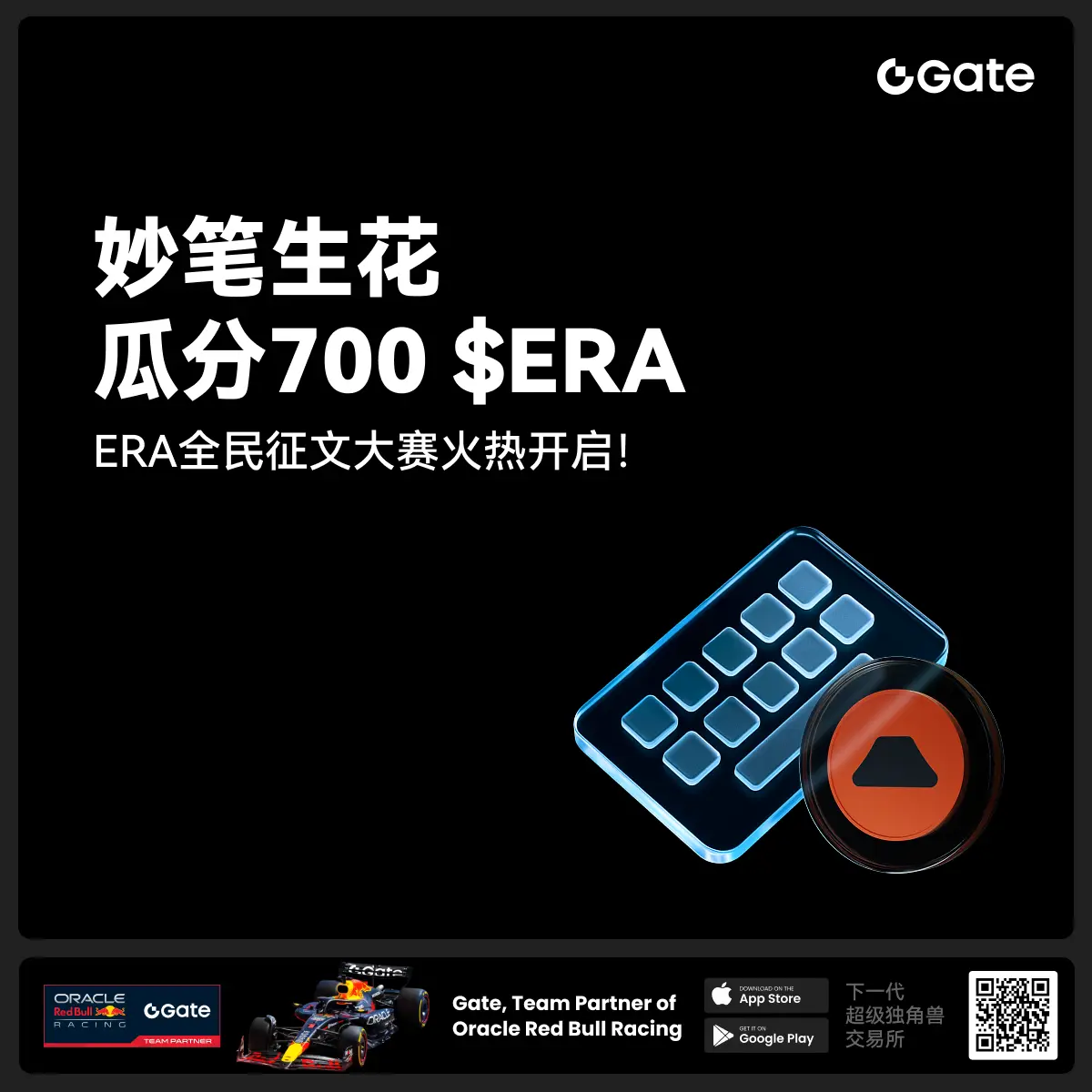更多
- 話題1/3
17k 熱度
10k 熱度
17k 熱度
7k 熱度
2k 熱度
- 置頂
- 🎉Gate 2025 上半年社區盛典:內容達人評選投票火熱進行中 🎉
🏆 誰將成爲前十位 #Gate广场# 內容達人?
投票現已開啓,選出你的心頭好
🎁贏取 iPhone 16 Pro Max、限量週邊等好禮!
📅投票截止:8 月 15 日 10:00(UTC+8)
立即投票: https://www.gate.com/activities/community-vote
活動詳情: https://www.gate.com/announcements/article/45974
- 📢 #Gate广场征文活动第二期# 正式啓動!
分享你對 $ERA 項目的獨特觀點,推廣ERA上線活動, 700 $ERA 等你來贏!
💰 獎勵:
一等獎(1名): 100枚 $ERA
二等獎(5名): 每人 60 枚 $ERA
三等獎(10名): 每人 30 枚 $ERA
👉 參與方式:
1.在 Gate廣場發布你對 ERA 項目的獨到見解貼文
2.在貼文中添加標籤: #Gate广场征文活动第二期# ,貼文字數不低於300字
3.將你的文章或觀點同步到X,加上標籤:Gate Square 和 ERA
4.徵文內容涵蓋但不限於以下創作方向:
ERA 項目亮點:作爲區塊鏈基礎設施公司,ERA 擁有哪些核心優勢?
ERA 代幣經濟模型:如何保障代幣的長期價值及生態可持續發展?
參與並推廣 Gate x Caldera (ERA) 生態周活動。點擊查看活動詳情:https://www.gate.com/announcements/article/46169。
歡迎圍繞上述主題,或從其他獨特視角提出您的見解與建議。
⚠️ 活動要求:
原創內容,至少 300 字, 重復或抄襲內容將被淘汰。
不得使用 #Gate广场征文活动第二期# 和 #ERA# 以外的任何標籤。
每篇文章必須獲得 至少3個互動,否則無法獲得獎勵
鼓勵圖文並茂、深度分析,觀點獨到。
⏰ 活動時間:2025年7月20日 17
- 📢 ETH衝擊4800?我有話說!快來“Gate廣場”秀操作,0.1 ETH大獎等你拿!
牛市預言家,可能下一個就是你!想讓你的觀點成爲廣場熱搜、贏下ETH大獎?現在就是機會!
💰️ 廣場5位優質發帖用戶+X瀏覽量前5發帖用戶,瓜分0.1 ETH!
🎮 活動怎麼玩,0門檻瓜分ETH!
1.話題不服來辯!
帶 #ETH冲击4800# 和 #ETH# 在 廣場 或 K線ETH下 圍繞一下主題展開討論:
-ETH是否有望突破4800?
-你看好ETH的原因是什麼?
-你的ETH持倉策略是?
-ETH能否引領下一輪牛市?
2. X平台同步嗨
在X平台發帖討論,記得帶 #GateSquare# 和 #ETH冲击4800# 標籤!
把你X返連結提交以下表單以瓜分大獎:https://www.gate.com/questionnaire/6896
✨發帖要求:
-內容須原創,字數不少於100字,且帶活動指定標籤
-配圖、行情截圖、分析看法加分,圖文並茂更易精選
-禁止AI寫手和灌水刷屏,一旦發現取消獎勵資格
-觀點鮮明、邏輯清晰,越有料越好!
關注ETH風向,創造觀點價值,從廣場發帖開始!下一個牛市“預言家”,可能就是你!🦾🏆
⏰ 活動時間:2025年7月18日 16:00 - 2025年7月28日 23:59(UTC+8)
【立即發帖】 展現你的真知灼見,贏取屬於你的ETH大獎!
- 🎉 #Gate Alpha 第三届积分狂欢节 & ES Launchpool# 聯合推廣任務上線!
本次活動總獎池:1,250 枚 ES
任務目標:推廣 Eclipse($ES)Launchpool 和 Alpha 第11期 $ES 專場
📄 詳情參考:
Launchpool 公告:https://www.gate.com/zh/announcements/article/46134
Alpha 第11期公告:https://www.gate.com/zh/announcements/article/46137
🧩【任務內容】
請圍繞 Launchpool 和 Alpha 第11期 活動進行內容創作,並曬出參與截圖。
📸【參與方式】
1️⃣ 帶上Tag #Gate Alpha 第三届积分狂欢节 & ES Launchpool# 發帖
2️⃣ 曬出以下任一截圖:
Launchpool 質押截圖(BTC / ETH / ES)
Alpha 交易頁面截圖(交易 ES)
3️⃣ 發布圖文內容,可參考以下方向(≥60字):
簡介 ES/Eclipse 項目亮點、代幣機制等基本信息
分享你對 ES 項目的觀點、前景判斷、挖礦體驗等
分析 Launchpool 挖礦 或 Alpha 積分玩法的策略和收益對比
🎁【獎勵說明】
評選內容質量最優的 10 位 Launchpool/Gate - 🎉【Gate 3000萬紀念】曬出我的Gate時刻,解鎖限量好禮!
Gate用戶突破3000萬!這不僅是數字,更是我們共同的故事。
還記得第一次開通帳號的激動,搶購成功的喜悅,或陪伴你的Gate週邊嗎?
📸 參與 #我的Gate时刻# ,在Gate廣場曬出你的故事,一起見證下一個3000萬!
✅ 參與方式:
1️⃣ 帶話題 #我的Gate时刻# ,發布包含Gate元素的照片或視頻
2️⃣ 搭配你的Gate故事、祝福或感言更佳
3️⃣ 分享至Twitter(X)可參與瀏覽量前10額外獎勵
推特回鏈請填表單:https://www.gate.com/questionnaire/6872
🎁 獨家獎勵:
🏆 創意大獎(3名):Gate × F1紅牛聯名賽車模型一輛
👕 共創紀念獎(10名): 國際米蘭同款球員衛衣
🥇 參與獎(50名):Gate 品牌抱枕
📣 分享獎(10名):Twitter前10瀏覽量,送Gate × 國米小夜燈!
*海外用戶紅牛聯名賽車折合爲 $200 合約體驗券,國米同款球衣折合爲 $50 合約體驗券,國米小夜燈折合爲 $30 合約體驗券,品牌抱枕折合爲 $20 合約體驗券發放
🧠 創意提示:不限元素內容風格,曬圖帶有如Gate logo、Gate色彩、週邊產品、GT圖案、活動紀念品、活動現場圖等均可參與!
活動截止於7月25日 24:00 UTC+8
3
BIS says stablecoins fail as money, calls for strict limits on their role
A new report from the Bank for International Settlements (BIS) challenges the notion that stablecoins can serve as real money in a modern financial system.
According to the BIS Annual Economic Report 2025, stablecoins fail the fundamental tests of “singleness,” “elasticity” and “integrity”— three critical criteria that define effective monetary instruments.
The BIS describes stablecoins as “digital bearer instruments” that resemble financial assets more than true money. “Stablecoins perform poorly when assessed against the three tests for serving as the mainstay of the monetary system,” the report claims.
Unlike central bank-backed money, which is accepted “at par” and requires no background checks, private entities issue stablecoins and often trade at fluctuating rates. This undermines the core principle of monetary singleness, it claims.
Stablecoins fail elasticity and integrity tests
Elasticity, the second test, is crucial for absorbing shocks and meeting large-value payment demands, BIS said in its report.
It pointed out that “any additional supply of stablecoins thus requires full upfront payment by its holders,” likening it to a “strict cash-in-advance setup” that contrasts with the flexibility of modern banking systems, where central banks provide liquidity as needed.
The third and perhaps most damning failure lies in the area of integrity. The report claims stablecoins’ design, especially those transacted via unhosted wallets on public blockchains, makes them prone to financial crime.
“Stablecoins have significant shortcomings when it comes to promoting the integrity of the monetary system,” the BIS notes, emphasizing their vulnerability to money laundering, sanctions evasion and terrorist financing.
Stablecoins should have a limited role
While acknowledging the continued demand for stablecoins due to features like cross-border accessibility and lower transaction costs, the BIS argues that these instruments should only play a limited, well-regulated role.
“Society can re-learn the historical lessons about the limitations of unsound money,” the report cautions. “Bold action by central banks and other public authorities can push the financial system along the right path, in partnership with the financial sector.”
Circle, the company behind USDC (USDC), saw its stock drop more than 15% on Tuesday after the BIS report, hitting $222. CRCL shares reached an all-time high of $299 on Monday.
Despite its hard take on stablecoins, the BIS report praised tokenization as a “transformative innovation” for the next-generation monetary and financial system. It said tokenization builds on the current financial system rather than replacing it.
Meanwhile, some in the crypto community said it is “no surprise” that the BIS paper is generally negative on stablecoins, given that it is a “regulatory body owned by global central banks.”
“The BIS is hysterical in its opposition to crypto,” Jim Walker, chief economist at Aletheia Capital Limited, wrote. “The first criterion, backed by a central bank, should make it a laughing stock given the historical failures of those institutions around the world.”
Magazine: MapleStory apologizes for cheaters, Tokyo Beast blows up in Japan, FIFA Rivals: Web3 Gamer